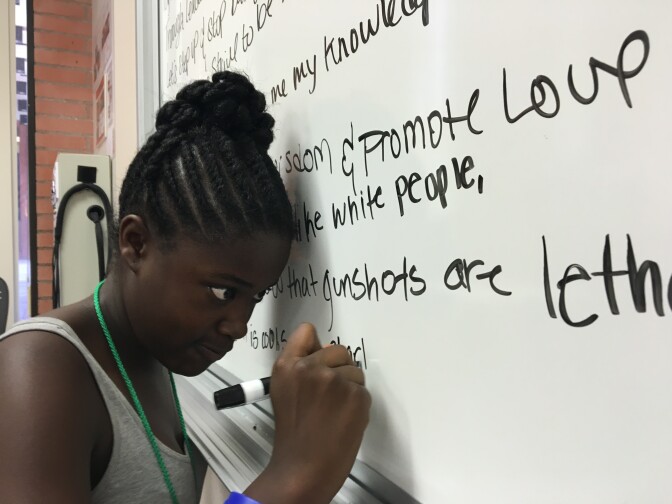This story is free to read because readers choose to support LAist. If you find value in independent local reporting, make a donation to power our newsroom today.
This archival content was originally written for and published on KPCC.org. Keep in mind that links and images may no longer work — and references may be outdated.
How kids at a civil rights summer camp have absorbed this summer's racially charged news
Eight middle school poets, all sitting in a small classroom, were stuck: the next rhyme in the poem they're all writing together was momentarily escaping them.
"Wait, I'll think of something," volunteered 13-year-old Samone Urasia Wade, closing her eyes, shifting in her seat, and raising two index fingers to her temple. "It's coming," she said. Finally, Samone's eyes opened.
"My skin does not define me, my knowledge does," Wade submitted. "Take these words of wisdom and promote love." The line met with the group's approval, so it gets scrawled on the white board.
These poets were some of the 120 black and Latino kids of all ages who gathered on the University of Southern California campus for a seven-week summer camp called "Freedom School," run by the Children's Defense Fund and the Community Coalition of Los Angeles. The program is named for the alternative schools civil rights leaders established 50 years ago to teach African-Americans how to organize and protest.
But in a summer of grim headlines, the discussions about race and democracy at this present-day Freedom School have not been confined to history books.

"Guys, I have a line," interjected Jalen McGee, 13. After cracking jokes all morning, Jalen had gone quiet, doodling and looking introspective.
"I think we should put, 'This doesn't mean we don't like white people, we just want you to know that a gunshot is lethal,'" McGee said.
The kids explained that line was meant to be a direct response to the slogan "All Lives Matter" — the a common response from those who are skeptical of the activist refrain "Black Lives Matter."
"All lives do matter," said Wade, who's going into the eighth grade at Orville Wright Middle School in Westchester, "it's just … the black and brown community are the ones being forgotten."
This summer's news has done a lot to confirm this belief. Two weeks after they first gathered for Freedom School, Alton Sterling was killed. Then Philando Castile. Then five Dallas police officers. But even if none of this had happened, these kids say violence and tensions with police would still be on their minds.
"They’re us," said Wade of Sterling and Castlie. "They’re us… They look like us, talk like us, walk like us. Like, they are us. That’s like my brother."
"Things like this are the most talked-about thing that's happening right now," said 12-year-old Donnell Sims, who goes to Bret Harte Preparatory Middle School in South L.A.
"I was always having nightmares," said 13-year-old Khali Vasquez. "I was afraid that— what would happen if this happened to my family?"
A recent Associated Press poll shows these anxieties are common among young African-Americans and Latinos. More than three-quarters of Latinos in the survey believed police killings of black people is an "extremely" or "very serious" problem. Among African-Americans, that figure is 91 percent.
But the poll also reveals huge racial disconnects about how we view this summer's news. The poll found a smaller proportion of white millenials — 48 percent of those surveyed — felt police killings of black people is as big of a problem. A larger proportion — 60 percent — felt that violence against the police is an "extremely" or "very serious" problem.
Our politics are just as divided. The survey showed just 2 percent of black millenials said they'd vote for Republican presidential candidate Donald Trump. But white millenials are split between Trump and Democratic nominee Hillary Clinton.
The racially-charged campaign — which has featured controversy over Trump's response to questions about the support he's received from white supremacist leaders and the candidate's declaration that he would build a wall along the U.S.-Mexico border at Mexico's expense — has unnerved some of the students.
"He would do it though," said 12-year-old Mya Melendez of Trump's plan to build a wall. "He would do it. He just wants to block every minority out. Like, 'They don't belong here. They shouldn't be here.'"
"I'm not trying to be racist or anything, but since a lot of white people support [Trump], it gets me nervous," said Sims, "because that means that he's going to get the presidency. So it kinda scares me because that'd make me scared to walk out at night."
Briana Lamb, a junior at Cal State University-Northridge and a camp counselor at Freedom School, says most of the students at the camp — many of whom come from L.A.'s least-privileged neighborhoods — have to deal with violence in their lives in one form or another. She hopes students leave Freedom School better-equipped to deal with that fear.
"I don't want you to live in fear," said Lamb, who attended Freedom School herself in high school. "I want you to live and be aware of what's going on."
The students' poem, which they performed at the closing ceremony this past weekend, is meant to reflect this sense of empowerment: "Let's step up and stop being so careless, while we strive to be more fearless," one line read.
Lamb hopes her students put that fearlessness to good use.
"With being aware," she said, "become an activist."








